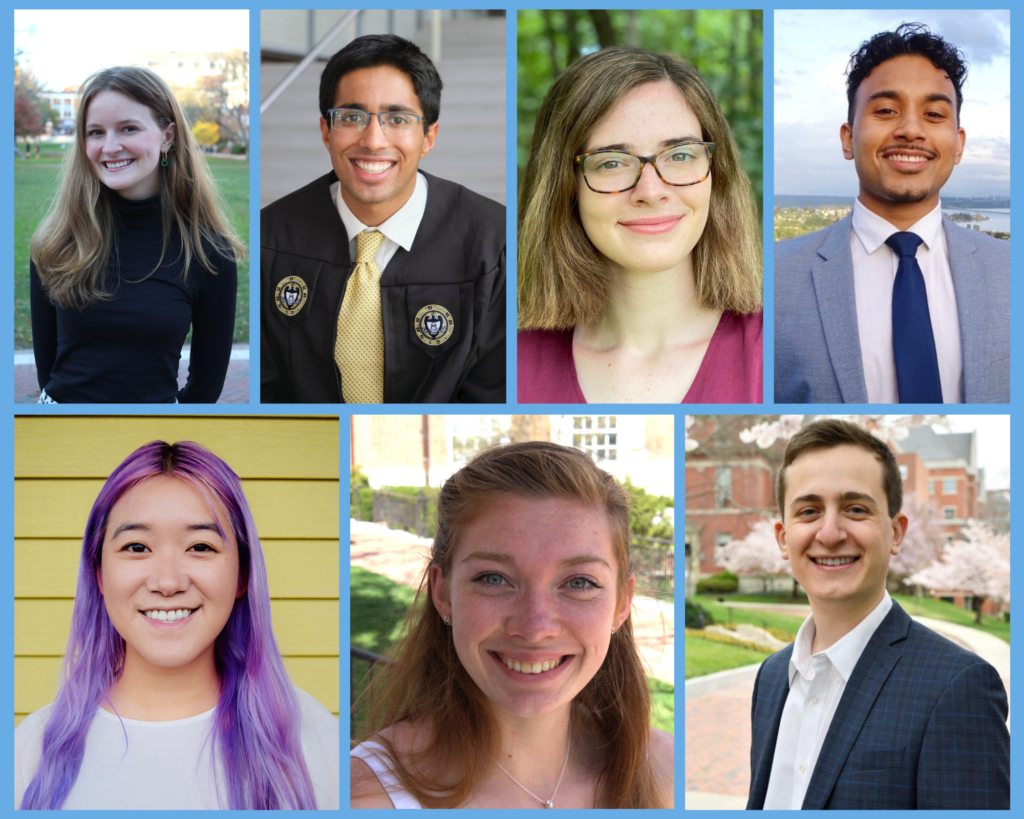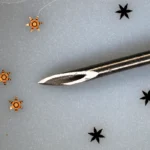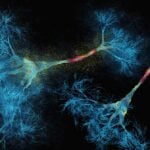INBT Students Among NSF GRFP Recipients

Above photo. Top row from left to right: Mia Grahn, Manav Jain, Caroline Ghio, Michael Chungyoun. Bottom row from left to right: Jessica D. Lin, Emma Whitehead, Max Kerensky
The National Science Foundation has awarded Graduate Research Fellowships to 26 students with ties to Johns Hopkins University. They have been selected for their outstanding work in science, technology, engineering, or math fields.
The NSF Graduate Research Fellows program is the oldest graduate fellowship of its kind. Fellows receive three years of financial support in the form of an annual stipend of $34,000 and a $12,000 cost of education allowance for tuition and fees paid to the institution. They have opportunities for international research and professional development and have the freedom to conduct their own research.
The 2023 NSF Graduate Research Fellows with ties to the Johns Hopkins Institute for NanoBioTechnology are:
Mia Grahn
Mentors: Denis Wirtz and Ashley Kiemen
Field of study: Chemical and Biomedical Engineering
“At the Institute for NanoBioTechnology, I conduct digital pathology research under Professors Ashley Kiemen and Denis Wirtz. Specifically, I have focused on three dimensionally reconstructing tissue from the pancreas to better understand the heterogeneous morphological changes associated with the onset of Type 1 Diabetes and pancreatic cancer.”
“I am so grateful to have been selected as a recipient of this fellowship and I am excited about the opportunities it will provide me with as I strive to make a difference in the research areas I am most passionate about! I would like to extend a huge thank you to my research mentors, Dr. Ashley Kiemen and Dr. Denis Wirtz, who have advised me since my freshman year. They have helped me learn and acquire many valuable skills that I will utilize throughout my research career and have led me to be successful in my computational pathology research during my time at Hopkins. I would also like to thank Dr. Richard Rustandi and Dr. Adam Sutton, for mentoring me this past summer at Merck, and for guiding me with helpful advice throughout this application process as well. “
Manav Jain
Mentors: Jonathan Schneck and Jordan Green
Field of Study: Biomedical Engineering
“I work in the labs of Dr. Jordan Green and Dr. Johnathan Schneck to design and test polymeric materials that can engineer/modulate immune cell function in several different ways. Going forward, I hope to design polymers that improve the efficacy and accessibility of cell and gene immunotherapies.”
“I am especially thankful for all of the graduate student mentors I have been fortunate to work with so far, both at Hopkins and in my undergraduate lab. I would never have even considered pursuing a career in research if it wasn’t for their support and willingness to train me.”
Caroline Ghio
Mentors: Reza Kalhor
Field of Study: Biomedical Engineering, specifically Synthetic Biology
“I am developing and applying new computational and molecular engineering tools to record gene expression and chromatin state during development and disease progression. The recording of dynamic changes in chromatin structure and gene expression will allow me to pinpoint specific changes or events that correlate with deviations from normal cell behavior. Developing technologies using this information will allow us to advance treatments for cancer, developmental disorders, and neurodegenerative diseases.”
“I am grateful to my PI, Dr. Reza Kalhor, the members of my lab, and all the professors I have had so far at JHU for their support!”
Jessica D. Lin
Mentors: Reza Kalhor
Field of Study: Neuroscience
“I am employing a retrospective lineage barcoding strategy to reconstruct a high-resolution map of the neural progenitor dynamics needed for brain development.”
“I would like to thank all of my mentors, especially my current advisor Dr. Kalhor. Their encouragement and guidance have been invaluable.”
Michael Chungyoun
Mentor: Jeff Gray
Field of Study: Chemical and Biomedical Engineering
“I’m a second-year PhD candidate in the Jeffrey Gray Lab, conducting research at the interface of antibody engineering and deep learning. I am engaged in developing computational models to design and enhance therapeutic antibody candidates. My ongoing research projects encompass the development of a diffusion-based generative model to facilitate the design of antigen-specific therapeutic antibodies. In addition, I’m also evaluating the efficacy of protein language models in capturing the biophysical properties of antibodies.”
“I am truly grateful for receiving the NSF GRFP in recognition of my research efforts. I also want to express my appreciation for my doctoral advisor, Jeffrey Gray, and my previous advisor, Elizabeth Nance, at the University of Washington, for fostering an academic environment that encourages ambitious and imaginative research directions.”
Emma Whitehead
Mentor: Warren Grayson
Field of Study: Biomedical Engineering
“At Hopkins, I have been a part of the Grayson Lab for Craniofacial and Orthopedic Tissue Engineering since my freshman year. I have worked on bone tissue engineering on many levels, from very translational, 3D-printed endeavors in large animal models, to finely nuanced osteoimmune studies of the craniofacial microenvironment. The overarching goal of my research has been to use tissue engineering to improve our approaches to the treatment of critical-sized craniofacial bone defects.”
“I am so grateful for everyone who was a part of my training at Hopkins, particularly Dr. Grayson and Allison Horenberg, and all the other amazing members of JHU BME that make the community what it is. The community in the lab is why I love research: there are always questions to ask, and people who are excited about finding new questions for every answer.”
Max Kerensky
Mentor: Nitish V. Thakor, Amir Manbachi, and Nicholas Theodore
Field of Study: Biomedical Engineering
“My primary innovations are in the neurotechnology space. As a biomedical engineer at Johns Hopkins, I have strategically partnered with leaders across the Hopkins landscape including Drs. Nitish Thakor, Amir Manbachi, and Nicholas Theodore. Together, the team is developing diagnostics and therapeutics for the spinal cord and beyond. I am pursuing this endeavor through the creation of ultrasound-based technologies which include advanced imaging modalities and novel focused ultrasound applications.”
“I am incredibly grateful for this fellowship. I thank the NSF and Johns Hopkins for the opportunity to advance my field. There are too many individuals to directly thank here, but I will utilize the GRFP to spread the support that I was so fortunate enough to receive.”
Latest Posts
-
 Johns Hopkins Postdoc Named in Forbes `30 Under 30′ List
December 8, 2025
Johns Hopkins Postdoc Named in Forbes `30 Under 30′ List
December 8, 2025
-
 Micro Grippers: David Gracias Builds Micromachines That Fold, Stick, Swim, and Sense—All Inside the Human Body.
November 20, 2025
Micro Grippers: David Gracias Builds Micromachines That Fold, Stick, Swim, and Sense—All Inside the Human Body.
November 20, 2025
-
 A bold new approach to autoimmune diseases
November 19, 2025
A bold new approach to autoimmune diseases
November 19, 2025


